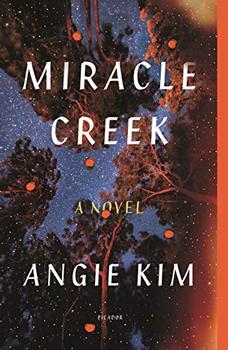Summary | Excerpt | Reading Guide | Discuss | Reviews | Beyond the Book | Readalikes | Genres & Themes | Author Bio

YOUNG YOO
SHE FELT LIKE A BRIDE walking into the courtroom. Certainly, her wedding was the last time—the only time—that a roomful of people had fallen silent and turned to stare as she entered. If it weren't for the variety in hair color and the snippets of whispers in English as she walked down the aisle—"Look, the owners," "The daughter was in a coma for months, poor thing," "He's paralyzed, so awful"—she might have thought she was still in Korea.
The small courtroom even looked like an old church, with creaky wooden pews on both sides of the aisle. She kept her head down, just as she had at her wedding twenty years ago; she wasn't usually the focus of attention, and it felt wrong. Modesty, blending in, invisibility: those were the virtues of wives, not notoriety and gaudiness. Wasn't that why brides wore veils—to protect them from stares, to mute the redness of their cheeks? She glanced to the sides. On the right, behind the prosecution, she glimpsed familiar faces, those of their patients' families.
The patients had all gathered together only once: last July, at the orientation outside the barn. Her husband had opened the doors to show the freshly painted blue chamber. "This," Pak said, looking proud, "is Miracle Submarine. Pure oxygen. Deep pressure. Healing. Together." Everyone clapped. Mothers cried. And now, here were the same people, somber, the hope of miracle gone from their faces, replaced by the curiosity of people reaching for tabloids in supermarket lines. That and pity—for her or themselves, she didn't know. She'd expected anger, but they smiled as she walked by, and she had to remind herself that she was a victim here. She was not the defendant, not the one they blamed for the explosion that killed two patients. She told herself what Pak told her every day—their absence from the barn that night didn't cause the fire, and he couldn't have prevented the explosion even if he'd stayed with the patients—and tried to smile back. Their support was a good thing. She knew that. But it felt undeserved, wrong, like a prize won by cheating, and instead of buoying her, it weighed her down with worry that God would see and correct the injustice, make her pay for her lies some other way.
When Young reached the wooden railing, she fought her impulse to hop across and sit at the defense table. She sat with her family behind the prosecutor, next to Matt and Teresa, two of the people trapped in Miracle Submarine that night. She hadn't seen them in a long time, not since the hospital. But no one said hi. They all looked down. They were the victims.
* * *
THE COURTHOUSE WAS in Pineburg, the town next to Miracle Creek. It was strange, the names—the opposite of what you'd expect. Miracle Creek didn't look like a place where miracles took place, unless you counted the miracle of people living there for years without going insane from boredom. The "Miracle" name and its marketing possibilities (plus cheap land) had drawn them there despite there being no other Asians—no immigrants at all, probably. It was only an hour from Washington, D.C., an easy drive from dense concentrations of modernity such as Dulles Airport, but it had the isolated feel of a village hours from civilization, an entirely different world. Dirt trails instead of concrete sidewalks. Cows rather than cars. Decrepit wooden barns, not steel-and-glass high-rises. Like stepping into a grainy black-and-white film. It had that feel of being used and discarded; the first time Young saw it, she had an impulse to find every bit of trash in her pockets and throw it as far as she could.
Pineburg, despite its plain name and proximity to Miracle Creek, was charming, its narrow cobblestone streets lined with chalet-style shops, each painted a different bright color. Looking at Main Street's row of shops reminded Young of her favorite market in Seoul, its legendary produce row—spinach green, pepper red, beet purple, persimmon orange. From its description, she would've thought it garish, but it was the opposite—as if putting the brash colors together subdued each one, so the overall feel was elegant and lovely.
Excerpted from Miracle Creek by Suki Kim. Copyright © 2019 by Suki Kim. Excerpted by permission of Sarah Crichton Books. All rights reserved. No part of this excerpt may be reproduced or reprinted without permission in writing from the publisher.
It was one of the worst speeches I ever heard ... when a simple apology was all that was required.
Click Here to find out who said this, as well as discovering other famous literary quotes!
Your guide toexceptional books
BookBrowse seeks out and recommends the best in contemporary fiction and nonfiction—books that not only engage and entertain but also deepen our understanding of ourselves and the world around us.